Australian Forbes Carlile Passes Away At 95: Swimming Mourns A Coaching Pioneer
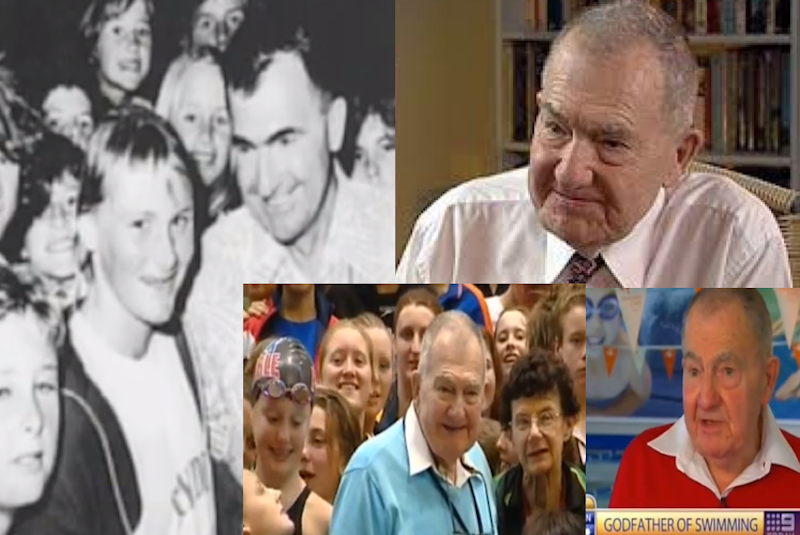
Obituary – Legendary Australian swim coach Forbes Carlile, MBE, passed away today on the eve of racing at the Rio 2016 Olympic Games. He was 95.
The following is the official statement and release on Carlile’s passing and tributes from coaches before this author’s memory and tribute to a coach pioneer and legend
Carlile was Australia’s first post-World War II Olympics swimming coach in 1948. He was also Australia’s first competitor in the modern pentathlon at the 1952 Olympics Games in Helsinki.
Forbes was a coach to many Australian champions. During his coaching career he produced 52 Australian team representatives, who have broken 31 individual world records between them. In all, he participated in 5 Olympic Games – London, Helsinki, Melbourne, Rome and Tokyo between 1948 and 1964. He was also selected as the Head Swimming coach at the 1980 Moscow Olympics but later withdrew.
Carlile studied at the University of Sydney under Professor Frank Cotton, graduating and later lecturing in human physiology. Together with Professor Cotton, they set up Australia’s first Sports Science lab at the University of Sydney. In 1946, at the Palm Beach rock pool, the pair set up a scientific swimming group. It was here that Forbes was able to structure training and measure the performance of athletes year round.
It was also at Palm Beach that Forbes first introduced the pace clock. This innovation has left the Carlile stamp on virtually every pool deck around the world. His book, Forbes Carlile on Swimming, was the first modern book on competitive swimming with its study of tapering and the historical development of the crawl. Other books by Carlile included A History of Crawl Stroke Techniques to the 1960s: An Australian Perspective and A History of Australian Swimming Training.
- In 1977, Carlile was inducted into the International Swimming Hall of Fame at Fort Lauderdale, USA. Other awards include the Queens Jubilee Medal (1977), ASI Life Member (2003) and NSSA Hall of Fame (2003).
- In 1977, Carlile was made a Member of the British Empire (MBE) for his services to swimming.
- In 1984, Carlile was inducted as a Life Member of the Australian Swim Coaches Association.
- In 1987, he was inducted as a Master Coach with the association.
- In 1989, Carlile was inducted into the Australian Sports Hall of Fame. While competitive swimming has been Forbes’ primary passion, he has been a pioneer in the development of learn-to-swim techniques, especially in the area of baby swimming.
- In 1961, together with his wife Ursula, the Carlile’s built the first Indoor heated teaching facility in NSW, in the backyard of their home at Cross Street in Ryde. Carlile Swimming continues to operate out of this facility today.
- Today, Carlile Swimming teaches over 25,000 children to learn to swim each week across 9 swim schools.
- In over 50 years, Carlile learn-to-swim centres have no doubt taught more Australians to swim than any other learn-to-swim school.
The guiding principle for the learn-to-swim programs is encapsulated in Forbes’s motto:
“To swim well is an asset for life.”
Forbes is survived by his wife Ursula, who in her own right is considered a legend of both Australian and international swimming.
Carlile Swimming Director, Richard Cahalan, said:
“The Carlile Swimming family is deeply saddened to hear of the passing of it’s founder, Forbes Carlile. A pioneer, an innovator, a scientist and widely considered as ‘swimming’s conscience’, Forbes will be sorely missed by his staff, his swimmers, his coaching peers and the worldwide swimming community. Our hearts go out to Ursula at this very sad time.”
Tributes to Forbes Carlile will pour for days. Here’s a selection of some of those so far:
In a note to Ursula Carlile, Coach Bill Sweetenham described her and Forbes as the “Greatest partnership in world sport”.
“… your winning partnership continues to leave a great legacy in world swimming and world sport. The passion that both of you had to change and improve the world of swimming must never be lost.”
In a tribute to the Carliles, Sweetenham recalls how as a young man he had applied for a job with the Carliles. The rejection letter “continued to inspire and spur me on for many years and when I finally had the opportunity to work with Forbes and you, my greatest dreams came true. No-one had more influence on my coaching life than both of you,” writes Sweetenham, later adding:
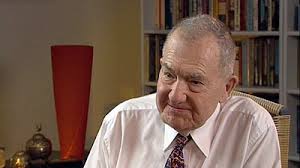
” … both of you led the way with insightful challenge and improvement of the current and ever-changing field of endeavour in world coaching. I thank you for this and owe you both a debt of gratitude which will be continue to be much appreciated by me and the many others who I am able to touch in the world of accurate decision making in the field of global coaching developed with consistency from the club level.”
Coach Wayne Goldsmith
With great sadness, I’ve just learnt that one of my great friend, long time mentor and teacher, Forbes Carlile has died.
His contribution to swimming across the world for the past 70 years is incalcuable – immeasurable.
His energy, his passion, his intelligence, his refusal to back down in any fight is legendary in the sport.
He led the world-wide battles against doping in swimming, the “silly” suits and the corruption that exists at the highest level of the sport.
The work he and Ursula were doing in swimming in Australia in the 1950s and 1960s was revolutionary – not just for swimming – but for all sport across the world.
At a time when most people thought using a stop watch was advanced coaching, Forbes and Ursula were on deck in the early 60s doing heart rate monitoring, conducting routine blood test screenings, analysing changes in blood pressure with exercise, looking at brain activity in athletes, experimenting with pre-cooling techniques, teaching athletes self-monitoring techniques….they changed the way sports science was done and gave Australia a huge advantage in swimming in that era – and laid the foundations for swimming science for every generation that followed..
To Ursula -my deepest sympathies and love at this time.
To Forbes – thank you my friend. I can never thank you enough for your time, your teaching, your direction, your mentoring and the hard kick up the bum you gave me regularly.
Everyone in swimming around the world owes you a greater debt that most will ever realise.
My Tribute To Forbes Carlile: The Cup We Named After Him
The SwimVortex Lifetime Achievement Award is named after the 2015 recipient: Forbes Carlile.
For as long as we are here, it will be known as the Carlile Cup.
(SOS, NB: – this file is from the private archive of SwimVortex, which closed in 2018 through lack of financial support for our work covering swimming and one of Carlile’s great passions: speaking out in the interests of athletes and coaches in the face of woefully poor, self-serving governance of the sport at global level with the acquiescence of the world’s major federations)
FINA having failed singularly to honour many of the biggest contributors to the sport of swimming, it has now let another towering contributor pass without ever saying “thanks for the outstanding contribution”. One of the pioneers behind and professors of swimming progress, Forbes Carlile passes without ever having received an honour from FINA.
Carlile was a thorn in the side of authorities that let the side down, as he saw it: he railed against FINA on doping, suits, poor governance and many other issues down the years.
Writing that line evokes memories of 2008 when the centenary dinner was coming up and I asked who would be at the party. Would Shane Gould, Debbie Meyer, Roland Matthes, Dawn Fraser, Mark Spitz and so on be there? No? Perhaps Forbes Carlile, Don Gambril? No? Well, how about Ada Kok and Mary T. Meagher, Matt Biondi, how about the terrific Greta Anderson? And so on and so forth.
No, no, don’t be silly. This was about 100 years of blazers, the seats for swimmers and coaches reserved for those who joined “The Family”. Sitting on their hands, their silence the key to staying and enjoying a subsidised front-row seat at the Olympic show. Now, there’s achievement for you.
We cannot account for the choices of others but we can make our own and celebrate them. The Carlile Cup is a prize we will grant each year as long as we remain and aimed at celebrating those whose contribution is not only deep in decades but delivered leadership and pioneering progress to swimming.
Forbes Carlile – Australia
Forbes Carlile was and remains a mover and shaker where it counts: in the pool and in his work with generations of children alongside his wife Ursula.
Carlile’s outstanding contribution to the sport of swimming, from the science, pace clock and interval training he harnessed to the role of conscience he has played at the helm of a movement for the betterment of swimming, extended to pioneering work as one of the first coaches to go overseas and head a foreign program (The Netherlands in the days of Ada Kok and teammates).
Carlile’s career speaks to one of FINA’s key fears: letting those who actually know swimming and work with it every day of their lives have a say at the top table in how things are run.
Below this fine memory of Carlile on his 90th birthday in 2011, a tribute to Carlile:
Now 94, Forbes Carlile can look back with pride on a life that included roles as graduate physiologist, lecturer at the University of Sydney, pioneer in scientific training and the pace clock, the first swimming author to deal with the concept of tapering, a term originated by Carlile and Professor Frank Cotton.
Carlile was Australia’s first modern pentathlon Olympic competitor (1952) and youngest Olympic coach (1948); Olympic Coach 1956 (Australia), 1964 (Holland). He was an official coach for Auystralia at the inaugural World Championships in 1973 and his career sheet includes nine world record holders, among them one of the all-time greats, Shane Gould. He also organised the Australian Swimming Coaches Association.
His pioneer efforts in sports science included interval workouts (1940s), the pace clock (1946), heart-rate tests (1956), training under stress and T-Wave studies. His book, “Forbes Carlile on Swimming” (1963), was the first modern book on competitive swimming and it is still significant for it’s consideration of “tapering” and it’s historical development of the crawl stroke.
Carlile looks back on a life as a globetrotting expert spreading the swimming word: a regular star guest and “one of us” at the ASCA World Clinic for many years, he also journeyed to clinics with Ursula to mainland China, Japan, USSR in those days, Ethiopia, Puerto Rico, Holland, North and South America and many parts of Europe.
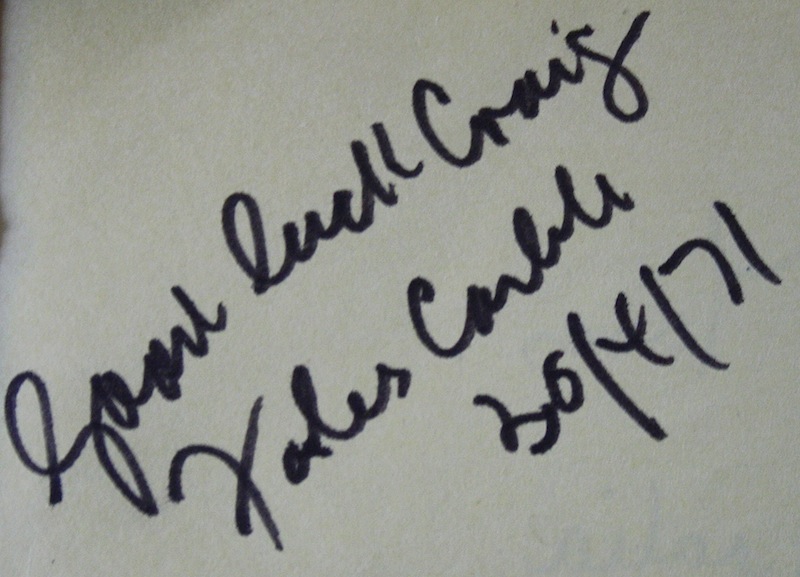
In 1971, he got stopped by a wee boy bearing an autograph book. “Would you sign my book, Mr Carlile?” I asked at Crystal Palace, the sights and sounds associated with world records from Gould and Karen Moras racing yet within me. Mr. Carlile did more than that. He knelt down, asked me how my swimming was going; asked me what I’d most enjoyed about the day; what was it that I learned. Then he signed my book.
Decades later at the breakfast table during ASCA clinic, the same man sat before me, soaking up what you had to say, what the next man had to say, questions un-ending, his thirst for knowledge unquenched. Here was a man to spend hours and hours with, the subjects of his conversation spilling well beyond the pool, though it was there with his toe in water than you might see him wear his passion on his sleeve.
Teacher, Tutor, Spyglass to Swimming
The Carlile swimming organization, operating on the North Shore, Sydney, has dozens of full and part-time coaches teaching more than 1,500 lessons a week with sessions for babies right through to those aspiring to be Olympic swimmers.
In his prime, Carlile was a colour man and expert for ABC (Australian Broadcasting Commission), that work spanning more than three decades of Olympics, Commonwealth Games and Nationals, his words serving as a spyglass to the world of swimming, meaning and context linked to events in a way that brought the swimmer out of the pool and into the consciousness of a wider audience in a nation hooked on water.
He has also produced five feature movies on swimming, covering some of his big concepts, such as the negative split, the importance of early development skills, mantras such as “better a has-been than a never-was”, “speed through endurance”, and the arm dominated high-tempo two-beat kick on crawl made famous by Gould on her shooting-star trajectory to the world-record books and three gold among five solo-event medals at Munich 1972 that remains a record among women in the fastest waters of all.
A Man Who Spoke Out & Called Others To Account
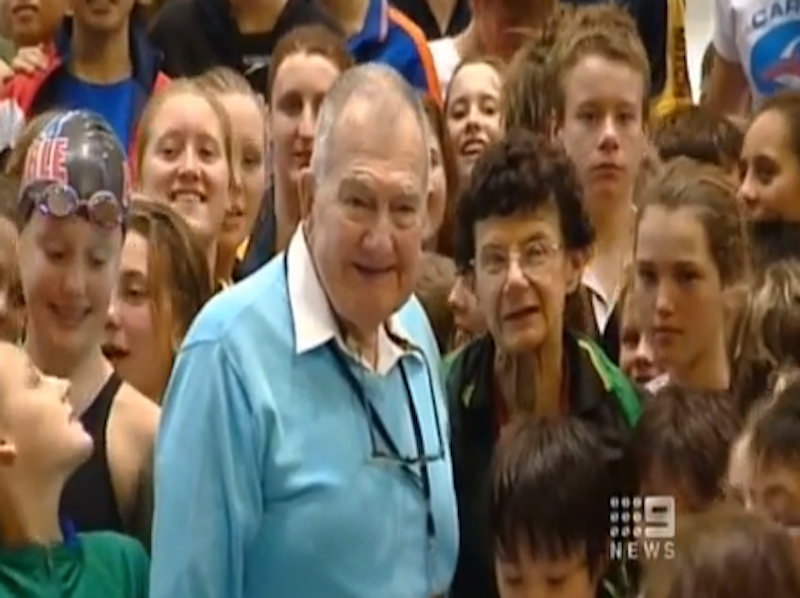
Here is a man whose journey through the world of swimming is more than pertinent to the debate over the role of coaches when it comes to who has a say in the governance of the sport.
The bottom line: coaches have no say. Yes, there are coaches commissions but they never fought the corner in a way that would spark meaningful change at FINA and other international feds that continue to run the show largely in their interests not in the interests of stakeholders.
Trawl back just over 40 years and come to the eve of the FINA world championship era, the cusp of greater commercial influence but still a time when blazers were king, swimmers, like children, were seen but not heard (and knew to hold their tongues if they knew what was good for them as tours and selections loomed) and coaches were mostly neither seen nor heard when it came to the crunch moment of big race day, let alone when it came to having any say whatsoever in the running of the sport. Some things have changed; some have not.
We could look at his coaching, his science, his vision but in the context of current events, we focus on that other aspect of the man that has been outstanding: he has long been a thorn in the side of those who govern swimming without actually understanding it; without taking into account the views of a great many of the key thinkers and stakeholders in the pool and on the deck.
It is 1971, the year before the Olympic Games in Munich, and Australia sends a squad to the Coca-Cola meet at Crystal Palace in London. Forbes Carlile is there with some of his charges, including world-record holder Karen Moras and a shooting star called Shane Gould, who matches Dawn Fraser‘s 100m free world mark at the start of an incredible record-breaking trajectory that came to rest at three Olympic gold medals, all won in world-record time, a silver, a bronze at the 1972 Olympic Games.
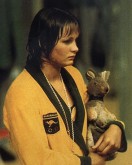
That remains the greatest solo haul at a single Games by a woman swimmer. And for those who live in our times, consider this: Carlile, at the very moment that he had a talent like Shane Gould in his pool, was not deemed worthy enough by Aussie blazers to be on the poolside when his charge was charging like no woman had ever charged before. Don Talbot was chosen by selectors to be coach, not head coach, a title yet to be born in 1971. Forbes’s wife and fellow coach at Ryde, Ursula, was added to the team (some reports from the time refer to her as ‘chaperone’ but officially she served as a coach, something of a breakthrough, for women and coaching) and was there for Gould, 14 and facing a monumental task and in need of being accompanied by someone she knew well and trusted.
Times changed and gradually, the USA leading the way as has so often been the case on a whole swathe of issues, coaches gained rights and respect. Even then, the level of recognition and how that manifests itself, has been relative, even in the nation that has led the way. In 1996, as Atlanta hosted the Olympic Games and as the wives, friends and corporate acquaintances of members of this and that federation and this and the other association sat in prime seats watching the action before floating off to cocktails and more in VIP lounges and other watering holes to which coaches are rarely, if ever, invited, the likes of coaching legends such as Nort Thornton, Don Gambril and the President of the World Swimming Coaches Association, Peter Daland (who also celebrated his 90th time round in the same year as Carlile), were to be found working as volunteers just so that they could get in and catch a glimpse of the Games.
Incredible as it may sound, Daland, a man who led some of the most successful USA swim teams in history, jumped at the chance of picking up garbage in the stands so that he could watch the prelims.
The rub is easy to see: comfy seats for many who contribute little or nothing at all to swimming; no access for those who got the kids to the Games in the first place, who worked with children from learn-to-swim through to national team. In Atlanta, those coaches and kids good enough to make team selection complained that they could not see the action at all because the number of seats allocated to them in the stand was less than 30% of what would have been needed. Volunteers Gambril and Daland raised the matter with FINA. Nothing to be done, came back the reply. There is, of course, always something that can be done. It largely depends on whether you want to do it.
One witness from the time was quoted as saying: “We, the coaches and athletes, are not important to these clowns. We just get in the way of their parties, their dinners, their socializing … If we don’t coach, and the swimmers don’t swim, the damn bureaucrats sit home and count paper clips.”
Not words that will have gone down at all well with the bureaucrats, of course. And the fact is that many who were coaching back in 1996 and many who were in power back in 1996 remain in power – and, like elephants, they never forget. The Us and Them of it all prevails, while the arguments of 1971 and 1996 remain as pertinent today.
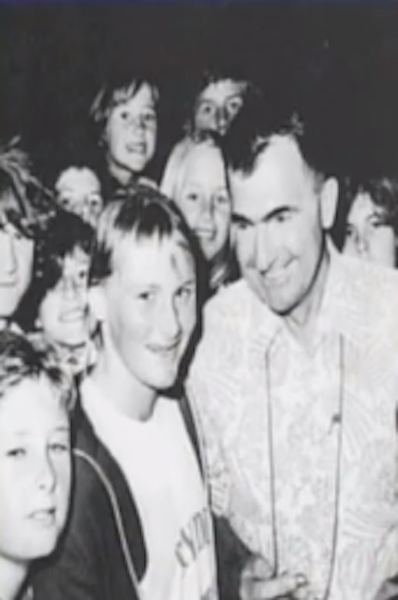
Take the following by John Leonard, director of the American Swimming Coaches Association back in 2010 that confirms the deaf-ear syndrome has been a long-term illness at FINA: “We must judge organizations by what they do; what they accomplish, not by what they say, and not by personalities. Personalities change, constitutions and formal documents that structure organizations in certain ways do not. I invited FINA President Larfaoui to our banquet, to present his side of the FINA view…he declined to answer. We are not even worth a phone call or letter. We are nothing in the eyes of FINA.
“The conclusion I reached after weeks of internal debate is quite simple. FINA is not going to reform itself. The perks, prestige and power to which I have referred are too seductive. They arrogantly believe that ‘they’ are the keeper of the Olympic Torch. When in truth, it rests in the hearts and minds of all us coaches and all our athletes at the pool in the early pre-dawn hours, working our way to become Olympian in body and spirit.”
He went on to say: “FINA was founded by amateurs. Coaches and other ‘professionals’ were strictly excluded. One hundred years later, we are still excluded. They don’t want to hear us. They don’t want to see us. They don’t want our ideas. They just want our labors. To sell TV time and tickets for entertainment. They hide behind tinted glass in their hospitality suites and look down on the multitudes in the heat. And they say ‘We’re FINA, we run the sport’. We can’t even get them to appoint one coach and one athlete to the FINA Bureau, to have our voices heard.”
That was 1996 (so no argument based on ‘give it time’ is valid on this particular thorny subject) and just four nations, including the US and Britain, voted in favour of a place for coaches on the Bureau, Leonard’s response: “There is a word for this condition, friends – and it is SLAVERY.”
Carlile has long been on the same song sheet. An award to Daland of late served as a token to a leading light. Largely, FINA continues to shun such people. They do so at their copst and risk.
If the likes of Carlile, Shane Gould, Don Gambril, Mark Schubert, Jacco Verhaeren, Eddie Reese and many, many others have, as one leading FINA light once put it, “no platform”, then FINA can be likened to a blighted house.In comic terms, we can turn for comparison to that fabulous Pythonian moment when Mr Cleese asks “what did the Romans ever do for us?”, before preceding to list the stunning legacy left by said Romans. Of course such greats of the world of swimming have a platform – and they always will have – and the media will always wish to listen to them.
Long past the moment when FINA ought to have listened to coaches and others.
Recent events, in which FINA completely ignored the warnings of the World Swimming Coaches Association when it came to the Moscow laboratory now exposed by WADA investigators as having been up to its neck in fraud, and in which the olive branch offered by Bill Sweetenham on behalf of many was entirely ignored, remind us that we’re looking at a particularly poorly leopard, its ailment self-inflicted, that has not only kept its spots but intends to keep them.
I was 28 and assigned to the business desk of The Times in London when a young boy called Lachlan Murdoch was placed on the desk next to mine as work experience. His father happened to own the company, News Corporation, and insisted on his offspring knowing what it was like to work on the core business if they were ever to make it to the boardroom themselves. Murdoch’s top table includes journalists, while journalists are among the right-hand men and women who help run a multi-faceted, multi-platformed business that is built on a foundation of … journalism. Best then to know what that is all about.
It works the same way in swimming.
The work of coaches is part of the very foundation of the sport of swimming. Leave coaches out and the structure is all the weaker for it. A challenge it would certainly be for some if coaches are called to the top table (and it would be a challenge for coaches too, for with position comes greater responsibility and accountability) – yet FINA, that organisation which ought to be bigger than any of the guardians passing through at any point in history, has much to gain too.
FINA gave its “Order”, the federation’s highest honour, to Vladimir Putin. It ought never to have done so. Had it given such honour to Carlile, it would have carried its constituency, held the hearts of the folk it is supposed to govern and protect and serve in equal measure.
FINA granted its highest honour to Putin on the cusp of the biggest systematic doping scandal since the GDR. The top honour also went to the Qatari regime and various political figures from nations with no swimmers nor elite swimming programs. The International federation has also left in place all the honours it granted to former FINA medical commission man Lothar Kipke, the GDR doctor convicted of crimes against minors for his brutal role in the State Plan 14:25 doping program, despite the ruling of a German court in the year 2000.
But … no honour for Forbes Carlile. Says it all.
10 Reasons Why FINA Should Have Honoured Forbes Carlile
- Carlile, Legendary Coach – Forbes Carlile began his coaching career at the Palm Beach rock pool on Sydney’s Northern Beaches. He was appointed Australia’s first post-World War II swimming coach for the 1948 Summer Olympics in London and would head the national team at the hugely successful 1956 Melbourne home Games, before become “scientific adviser to the Australian team at Rome 19690 and then head coach to The Netherlands at the 1964 Olympic Games. He is credited with coaching 52 Australian International swimmers, who claimed 12 Olympic titles between them. Three of those belonged to Shane Gould, whose soaring career included holding all freestyle World records 100m to 1500m simultaneously. Her feat of five solo medals at Munich 1972 remains a record.
- Carlile, Olympic athlete – in 1952 Carlile became the first person to coach and later compete in the Olympic Games. He was Australia’s first competitor in the modern pentathlon, a feat that prompted the Queensland Times to describe him as “an army of his own”, something that would ring true down the years on many levels, including his advocacy for coaches in the struggle for recognition by governing bodies.
- Carlile, apprentice to Frank Cotton – Carlile was a pupil of Professor Frank Cotton who, in 1940, invented the “Cotton aerodynamic anti-G flying suit”, which prevented pilots from blacking out when making high-speed turns. It was used extensively by the Allied Forces during World War II. Prof. Cotton, widely viewed as the father of sports science in Australia, also invented the ergometer, a machine to test athletic potential. After graduating with a Masters of Science from the University of Sydney, Carlile became Cotton’s apprentice and assistant at the swim program he ran.
- Carlile, lecturer in human physiology – Carlile lectured in human physiology at the University of Sydney and later human physiology. Two years before his debut as an Olympic athlete he ran a marathon so that he serve as guinea pig in his own study of the physical reactions of athletes to long-distance running. The Adelaide Advertiser described Carlile’s research effort as “bent on extending the store of human knowledge in respect to human exertion”.
- Carlile Swimming – Carlile has been teaching children to swim since 1955, when Forbes and Ursula launched Carlile Swimming. They catered for all levels, including the establishment of a link to a university program that allowed athletes to study and swim. By the time Forbes passed away, Carlile Swimming employed more than 600 staff across 11 swim centres in NSW and Victoria.
- Carlile, A Pioneer of Interval Work – some deep-seated training methods still in use today owe much to the work of Forbes Carlile, who, with Ursula, revolutionised swimming. Carlile shook the sport up with new focus on the significance and usefulness of warm-ups, tapering and the practice of “shaving down”. He was a pioneer of interval workouts, stress training, pace clocks and log books, heart-rate tests and tapped into his academic research to conduct T-wave studies of the ventricles of the human heart.
- Carlile On Pace – Carlile was responsible for taking seconds off race times with the implementation of even-paced swimming. He encouraged swimmers to maintain an even pace throughout an entire race, rather than exerting maximum effort in the beginning stages. He found that swimmers usually compensate for the speed they give up early on in the race by increased or maintained speed in the later stages, resulting in a faster overall time. This slower initial pace delays the onset of lactic acid, which, once set in, has the effect of slowing the athlete down.
- Carlile on Kicking – The six-beat kick had ling been established on freestyle It was also known as “flutter” kick. Then, Carlile encouraged the use of 2-beat kicking for long-distance events: the swimmer could conserve energy and therefore maintain a greater speed for longer distances, while technically, some swimmers benefited from the greater stability of core using a two-bet kick. Shane Gould was a, if not the, prime example.
- Carlile on Sports psychology – Carlile went beyond the physical aspects of elite athletic performance and was among the first to delve into the role of psychology. A strong advocate for the importance a healthy mental approach to training and life, he claimed in 1955 article in the Perth Sunday Times, that an athlete’s skill, physique and training are “best applied when used together with the mind”. Athletes must be happy, he said, writing: “An unhappy athlete is like a swimmer with leaden boots on or a footballer with an arm in a sling.”
- Carlile the scribe – In 1963 Forbes Carlile on Swimming was published. It was the first to study tapering for athletes and the historical development of the crawl, or freestyle. Carlile followed his first title with A History of Crawl Stroke Techniques to the 1960s: An Australian Perspective and A History of Australian Swimming Training.
Why didn’t FINA honour Forbes Carlile … ? Because he dared to tell them where he felt they were going wrong and demanded that they change course.
Bravo Forbes Carlile – we, this author and those who work with me, salute you, we honour you, we recognise Ursula’s right hand and pledge to keep your work and name aglow for as long as we remain.
RIP – and condolences to Ursula.